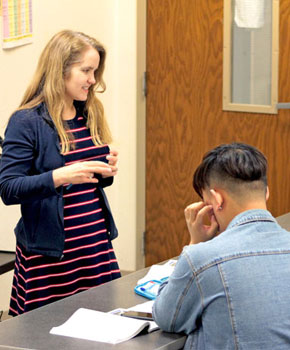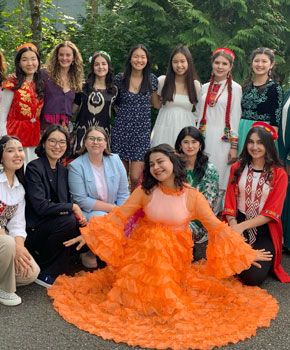Green River College International
GREEN RIVER COLLEGE INTERNATIONAL STUDENTS GAIN ADMISSION TO THE TOP 100 UNIVERSITIES
YEAR AFTER YEAR - Students come to GRC for their first two years of university, work hard, and then
have exciting options when it comes to university transfer. UC Berkeley and the University
of Washington, Seattle, are some of our most popular transfer destinations. Our students
have transferred to 72 of the top 100 universities. - Read More.
Green River College International Programs prides itself on the great programs and services it offers. Our goal is to help you achieve your dreams, whether it is to transfer to a top university, finish high school, better your English, or experience the American college life.
"We are committed to helping students achieve their dreams, transform their lives, and make the world a better place." - Dr. Wendy Lee Stewart, Vice President of International Programs
Our Programs

University Transfer
Our 2+2 transfer program offers students an opportunity to start their 4-year bachelor's degree. The transfer program provides courses equivalent to the first two years of a university degree.

High School Completion Plus
For students who want to complete high school and college credits at the same time. It’s a fast track to a US university degree and an excellent option for High School Exchange Students.

Intensive English
For international students who want to prepare for academic study at American colleges and universities. We offer small classes and personal attention from highly qualified instructors.

Bachelor of Applied Science (BAS)
Green River College offers innovative Bachelor of Applied Science (BAS) Programs that prepare students for immediate entry into jobs.

Gap Year
Provides an opportunity for students who want to study abroad in the U.S. during the year between secondary education and college.

Short Term Custom Programs
GRC can develop customized programs based off your specific requirements which would include high quality lectures, excursions, intercultural communication opportunities, and volunteer opportunities based on the needs of your request.
Top 10 Reasons to Choose GRC
-
A leader in university transfer
-
Award-winning college
-
Individual advising to help you meet your goals
-
On campus student housing
-
Great programs including Intensive English and High School Completion
-
Peer mentoring and leadership development programs
-
Beautiful campus surrounded by forest and trees
-
University Transfer Pathways agreements with 40 four-year universities
-
Active student life on campus
-
New modern buildings and facilities

Location
Green River College is 45 minutes south of Seattle, Washington in the USA.
Green River College is situated in Auburn, Washington, a city with a population of 84,000. Auburn has a large shopping mall, several movie theaters, a concert venue, parks, and athletic facilities.
- 45 minutes to Seattle
- 25 minutes to Seattle-Tacoma International Airport
- 2 1/2 hours to Vancouver, Canada
- 2 hours to the Pacific Ocean beaches
- 2 hours 40 minutes to Los Angeles (by plane)
- 2 hours 10 minutes to San Francisco (by plane)






